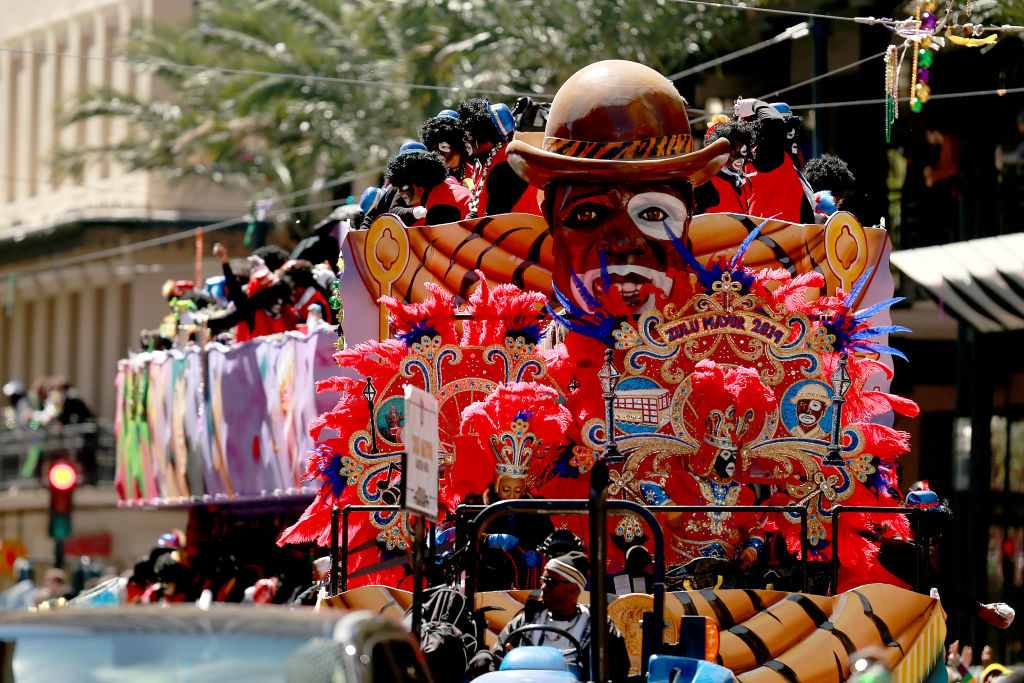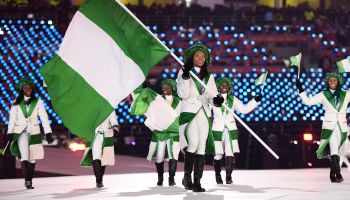
Memebers of the Zulu Social Aid and Pleasure Club parade down St. Charles Avenue on Mardi Gras Day on March 5, 2019, in New Orleans, Louisiana. | Source: Sean Gardner / Getty
UPDATED: 11:00 a.m. ET, Feb. 12, 2024
Mardi Gras, which means Fat Tuesday in French, is largely associated with New Orleans in the United States, although it originally began in the U.S. in the city of Mobile, Alabama. The annual celebration that predates the Lent season is held globally, however, keeping true to its European roots.
This year, Mardi Gras falls on Tuesday, Feb. 13.
As recorded by the Library of Congress, Mardi Gras began in 1703 at 27 Mile Bluff in Mobile by way of French colonizers who brought the tradition of “Shrove Tuesday” or “Fat Tuesday” to American shores. The indulgence in rich foods and wines was often done before the 40-day fasting season of Lenten.
That said, Black folks love them some Mardi Gras, and the celebration has a real Black history to it.
For many people, the celebration in New Orleans is a magical place where they can also have fun, let their hair down and be themselves. Oh, and catch beads, too.
The Black history of Mardi Gras
In 1830, a drunken Dutchman named Michael Kraftt took to the streets with other revelers and organized a parade, thus creating the first “krewe” Cowbellion de Rakin Society, the first parading Mystic Society. This tradition of parading with cowbells and garden tools occurred annually.
In 1856, six businessmen, three of whom hailed from Mobile, established a secret society inspired by Kraftt’s Mobile group called the Mistick Krewe of Comu and planned New Orleans’ first Mardi Gras parade.
For about a decade, the celebrations were halted due to the Civil War but reconvened in 1866. Joseph Stillwell Cain and his men added costumes and other flair to their parade in Mobile. In 1867, the oldest continuous Mardi Gras parade society, the Order of Myths, was created.
In 1872, the celebration began naming a royal court, a tradition that continues today. In 1875, the state of Alabama declared Mardi Gras a holiday in Mobile and in 1938, the Colored Carnival Association was founded and the first Black Krewe, the Knights of May Zulu. In the ‘70s, the CCA was renamed the Mobile Area Mardi Gras Association.
Mardi Gras parades
The parades are not just a time for celebration, especially with this season’s festivities, which started in January and end Tuesday. There are plenty of moments for folks to reflect on the history involving Black and brown-skinned people in the “Fat Tuesday” festivities on the final day of the Carnival season and the day before Ash Wednesday, the first day of Lent.
The Zulu community has been a viable force behind the traditions of Mardi Gras even though in previous years it found itself under scrutiny surrounding its practice of participants wearing blackface.
Aside from the popular Zulu coconuts, the community also began balls or dances for those attending the celebration. They also lend a helping hand behind the scenes each year to Mardi Gras.
Another central component to the celebration is Mardi Gras Indians, made up, in large part, of the African-American communities of New Orleans’ inner city. The group named themselves after Native Americans to “pay them respect for their assistance in escaping the tyranny of slavery.”
Nearly 50 tribes have members who create extravagant hand-beaded and feathered suits for marches on Mardi Gras Day and Super Sunday, which is the Sunday closest to St. Joseph’s Day on March 19. This is a less-recognized tradition that is believed to date to the antebellum period when escaped slaves found shelter with Native American tribes. The Mardi Gras Indians are known to be secretive, intentionally not announcing their parade times or routes publicly in advance, according to Mardi Gras New Orleans.
It is also important to note that slavery and racism drove Black folks to form their cultural styles for celebrating Mardi Gras. Those in the city’s poorer neighborhoods didn’t feel as if they could celebrate in the mainstream New Orleans parade. Their celebrations during Mardi Gras have come out of a place of resistance and resilience. Perhaps those Black folks visiting Mardi Gras this year will take some time to think about this history.
SEE ALSO:
















